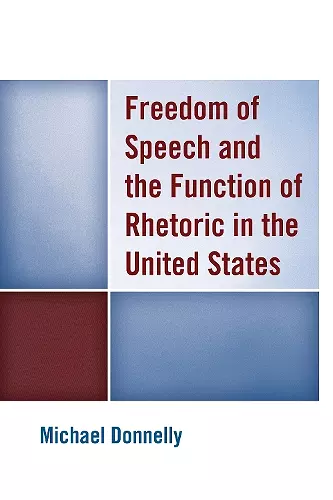Freedom of Speech and the Function of Rhetoric in the United States
Format:Paperback
Publisher:Lexington Books
Published:17th Apr '18
Currently unavailable, and unfortunately no date known when it will be back
This paperback is available in another edition too:
- Hardback£72.00(9781498513555)

This book is about Freedom of Speech and public discourse in the United States. Freedom of Speech is a major component of the cultural context in which we live, think, work, and write, generally revered as the foundation of true democracy. But the issue has a great deal more to do with social norms rooted in a web of cultural assumptions about the function of rhetoric in social organization generally, and in a democratic society specifically. The dominant, liberal notion of free speech in the United States, assumed to be self-evidently true, is, in fact, a particular historical and cultural formation, rooted in Enlightenment philosophies and dependent on a collection of false narratives about the founding of the country, the role of speech and media in its development, and the relationship between capitalism and democracy. Most importantly, this notion of freedom of speech relies on a warped sense of the function of rhetoric in democratic social organization. By privileging individual expression, at the expense of democratic deliberation, the liberal notion of free speech functions largely to suppress rather than promote meaningful public discussion and debate, and works to sustain unequal relations of power. The presumed democratization of the public sphere, via the Internet, raises more questions than it answers—who has access and who doesn’t, who commands attention and why, and what sorts of effects such expression actually has. We need to think a great deal more carefully about the values subsumed and ignored in an uncritical attachment to a particular version of the public sphere. This book seeks to illuminate the ways in which cultural framing diminishes the complexity of free speech and sublimates a range of value-choices. A more fully democratic society requires a more critical view of freedom of speech.
Michael Donnelly’s important study takes a critical look at the issue of “free speech” and the uses to which free speech arguments are put in U.S. political discourse. Exposing what he terms “a collection of false narratives” at the root of liberal theories of free speech, Donnelly’s findings run against the grain of conventional approaches to the subject, some of which are either implicitly or overtly at work in composition classes across the country. With refreshing clarity, Donnelly argues that free speech was not fundamental to the founding of democracy in the U.S. and that the support of the unfettered expression of opinion in a “marketplace of ideas” is harmful rather than helpful to deliberative democracy. -- Susan C. Jarratt, University of California, Irvine
ISBN: 9781498548922
Dimensions: 223mm x 153mm x 9mm
Weight: 191g
120 pages